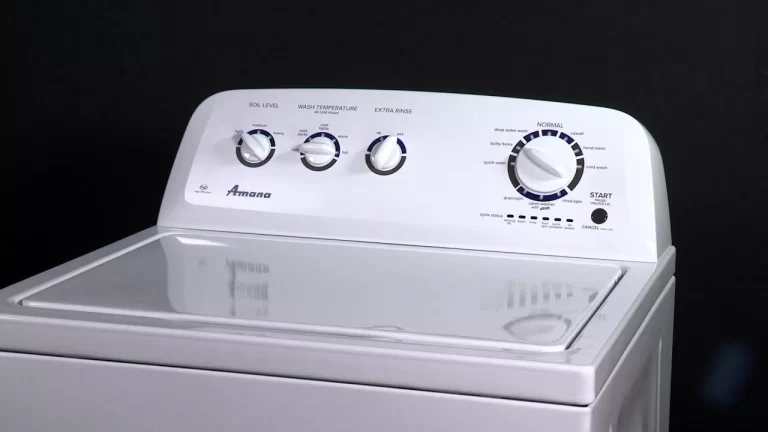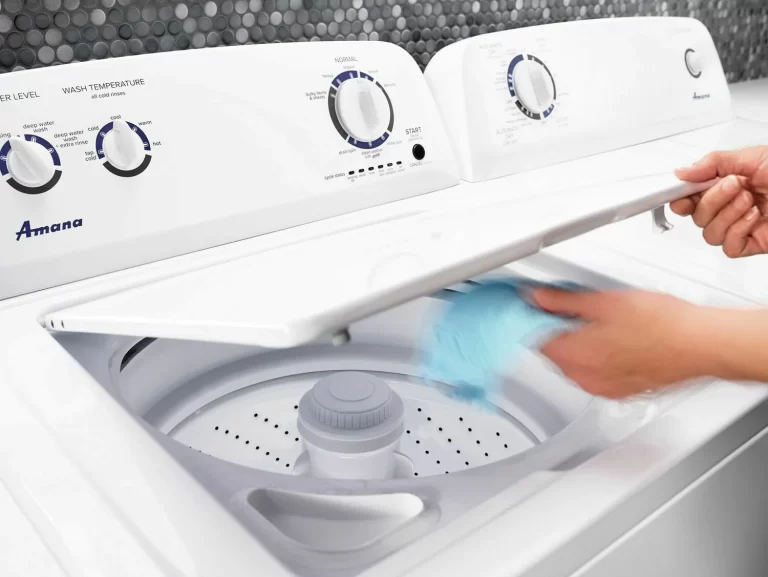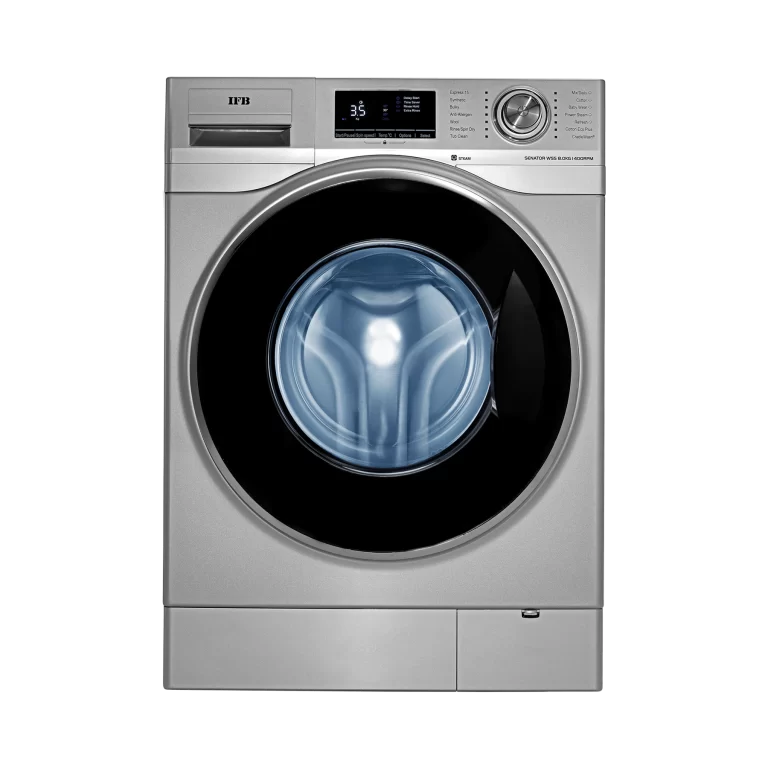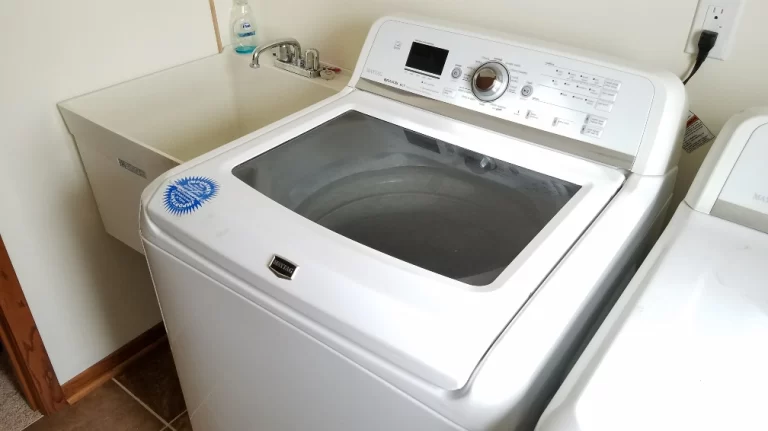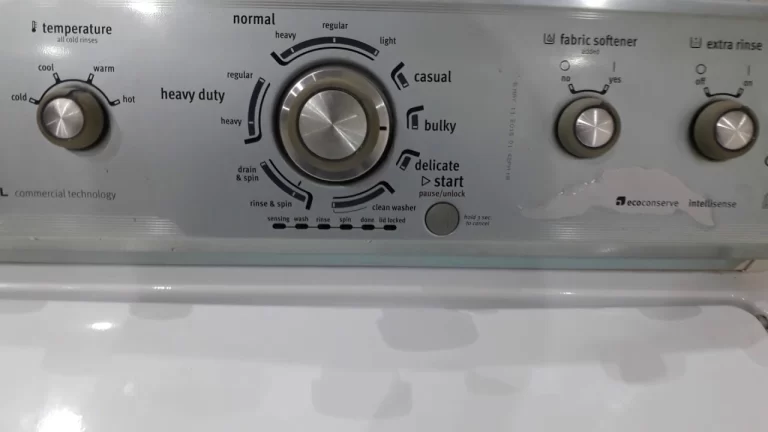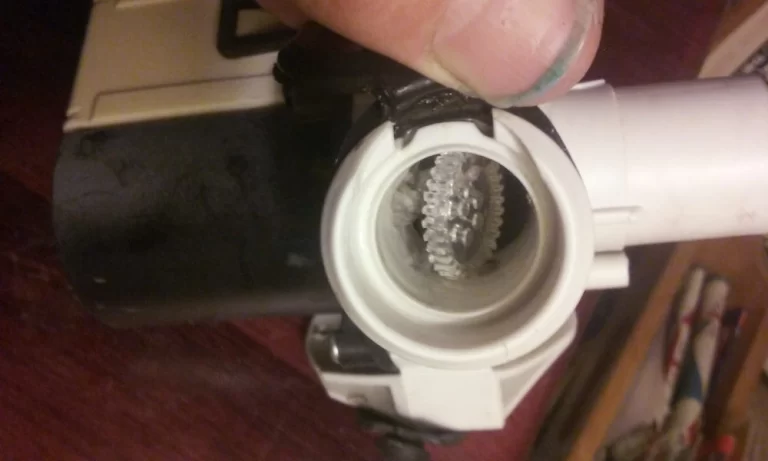Are you disturbed by a loud noise during the spin cycle in your GE top load washer? You’re not alone. Many users face similar issues with their washing machines, which can turn a simple laundry day into a headache. Understanding how to troubleshoot washing machine noise not only offers peace of mind but can also save you time and money on unnecessary service calls. In this comprehensive guide, we’ll walk you through the reasons behind the noise and provide effective solutions to keep your washer running smoothly.
If your GE top load washer is making loud noises during the spin cycle, it could be due to issues like an unbalanced load, damaged bearings, a faulty drive pulley, motor issues, a loose drive belt, worn-out shock absorbers, a faulty washer clutch, a damaged washer tub, a blocked drain pump, or worn-out agitator dogs.
Quick Troubleshooting Guide
| Issue | Symptoms | Fixes |
| Unbalanced Load | Washer rocking excessively or making loud thumping noises. | Pause the washing machine, redistribute clothes evenly, and restart the machine. |
| Damaged Bearings | Loud roaring or grinding noise during the spin cycle. | Replace the damaged bearings. Might require professional assistance. |
| Faulty Drive Pulley | High-pitched squeaking to grinding noises. | Tighten or replace the faulty drive pulley after disconnecting the washer from power. |
| Motor Issues | Loud noises throughout the cycle, not just during spinning. Possible smell of burning. | Replace worn-out motor brushes or consider replacing the entire motor. It’s advised to seek professional help. |
| Loose Drive Belt | Squealing or squeaking noise, drum not spinning efficiently. | Adjust the tension or replace the damaged belt. |
| Worn Out Shock Absorbers | Washer shakes violently or makes banging sounds. | Replace the worn-out shock absorbers following manufacturer guidelines. |
| Faulty Washer Clutch | Scraping noise during spin cycle, drum not reaching full speed. | Replace the faulty washer clutch following manufacturer guidelines. |
| Damaged Washer Tub | Rattling or banging noise. | Check for dents or loose parts. Seek professional help if damaged. |
| Blocked Drain Pump | Humming or rattling noise, washer not draining properly. | Check for obstructions in the pump and remove any found. Replace the pump if damaged. |
| Worn Out Agitator Dogs | Ratcheting or ticking noise, agitator not rotating properly. | Replace the worn out agitator dogs. |
Understanding the issue of ge top load washer makes loud noise during spin cycle

When your normally quiet GE top load washer begins making loud noises during the spin cycle, it’s a clear signal that something isn’t right. Understanding what’s causing these loud noises is the first step towards finding a solution. The spin cycle, in particular, can be a stress point for the washer, causing the most noise when something is awry.
The spin cycle involves high-speed rotations, putting substantial stress on the washer’s components. When functioning correctly, these components work seamlessly together, providing an effective, efficient, and relatively quiet operation. However, when parts are worn, broken, or unbalanced, they can cause various loud noises.
There are several reasons for your GE top load washer to make loud noises during the spin cycle, each with distinct sounds that provide clues to the underlying problem. Unbalanced loads, for instance, often cause loud thumping or banging noises as the clothes’ weight is thrown off-center. In contrast, a broken drive belt might emit a high-pitched squealing sound.
Furthermore, foreign objects lodged in the machine, such as coins or small items left in pockets, can rattle around and create noises during the spin cycle. Faulty components, like a worn-out motor, damaged bearings, or a faulty drain pump, can also cause the washer to generate loud sounds.
As each issue has distinct causes and fixes, accurately diagnosing the problem is vital. It’s also important to remember that the spin cycle is a complex operation. If DIY troubleshooting and simple fixes don’t solve the problem, it’s wise to call in a professional to ensure your washer isn’t further damaged by well-intentioned repairs.
Understanding what’s causing your washer’s loud noises during the spin cycle will not only help you address the immediate issue, but also shed light on how to prevent future problems, ensuring the longevity of your GE top load washer.
Common GE Top Load Washer Problems With Fixes
Identifying the source of washer noise is half the battle in troubleshooting. The common culprits often involve an unbalanced washer load, damaged washer bearings, issues with the washer drive pulley, or washing machine motor issues. According to a report by Consumer Reports, about 14% of newly sold washers are likely to develop problems or break within the first five years, with noise and vibration being the most common complaints1.
1. Unbalanced Load
Issue: This occurs when the laundry inside the drum isn’t evenly distributed. This imbalance in weight can cause the washer to spin harder on one side, leading to loud noises and excessive vibrations.
Symptoms: The washer rocks excessively or makes loud thumping noises, especially during the spin cycle.
Fix:
- Pause the washing machine.
- Open the door and redistribute the clothes evenly around the washer drum.
- Restart the washing machine and observe if the noise persists.
2. Damaged Bearings
Issue: The drum bearings allow the tub to spin freely with minimal friction. Over time, due to wear and tear or water leakage, these bearings can get damaged, leading to an increase in friction and noise.
Symptoms: The washer makes a loud roaring or grinding noise, especially during the spin cycle.
Fix:
- Purchase a new set of bearings suited to your washer model.
- Unplug the washer and open the back panel to access the bearings.
- Remove the old bearings and replace them with the new ones.
- Close the back panel and plug the washer back in.
Note: This can be a complicated process, so seeking professional help might be necessary.
3. Faulty Drive Pulley

Issue: The drive pulley is responsible for transferring motion from the motor to the tub. It can become loose or damaged over time due to wear and tear, which can cause loud noises during the spin cycle.
Symptoms: The washer makes a variety of sounds, from high-pitched squeaking to grinding during operation.
Fix:
- Disconnect the washer from the power source.
- Remove the back panel of the washer to access the drive pulley.
- Inspect the pulley for damage or wear. If it’s loose, tighten it; if it’s visibly damaged, replace it.
- Reassemble the washer and reconnect it to the power source.
4. Motor Issues
Issue: The motor is crucial for the operation of your washing machine. Over time, parts of the motor like the brushes can wear out, or the motor can overheat, leading to loud noises during the spin cycle.
Symptoms: The washer makes loud noises throughout the cycle, not just during spinning, and it may smell like burning.
Fix:
- Unplug the washing machine.
- Open the washer’s back panel to access the motor.
- Inspect the motor for signs of wear, damage, or overheating.
- If the motor brushes are worn out, replace them. If the motor is overheating or damaged, consider replacing the motor or seeking professional help.
5. Loose Drive Belt
Issue: The drive belt connects the motor to the wash drum and aids in the spinning of the drum. Over time, the belt can become loose or worn out, leading to inefficiency and noise.
Symptoms: The washer makes a squealing or squeaking noise, and the drum might not spin efficiently.
Fix:
- Disconnect the washer from the power source.
- Remove the back panel to access the drive belt.
- Check the belt for looseness or damage. If it’s loose, adjust the tension; if it’s worn or damaged, replace it.
- Reassemble the washer and reconnect it to the power source.
6. Worn Out Shock Absorbers
Issue: Shock absorbers are designed to dampen the movement of the washing machine’s tub. Over time, they can wear out or break, causing excessive movement and noise during the spin cycle.
Symptoms: The washing machine shakes violently or makes banging sounds during the
spin cycle.
Fix:
- Disconnect the washer from the power source.
- Access the shock absorbers (usually located at the corners of the washer tub).
- Inspect the shock absorbers for damage or wear. If damaged, they will need replacement.
- Replace the shock absorbers following the manufacturer’s guidelines for your specific model.
- Reassemble the washer and reconnect it to the power source.
7. Faulty Washer Clutch
Issue: The washer clutch helps the drum gradually increase spin speed. If it’s damaged or worn out, it can cause loud noises when the machine transitions into the spin cycle.
Symptoms: The washer makes a scraping noise during the spin cycle, or the drum has trouble reaching full spin speed.
Fix:
- Disconnect the washer from the power source.
- Open the washer’s back or bottom panel to access the clutch.
- Inspect the clutch for wear or damage. If it’s visibly worn or damaged, it will need replacement.
- Replace the clutch following the manufacturer’s guidelines for your specific model.
- Reassemble the washer and reconnect it to the power source.
8. Damaged Washer Tub
Issue: The washer tub can get damaged due to overloading or a foreign object left in clothing. This can cause noise during the spin cycle.
Symptoms: The washer makes a rattling or banging noise, especially during the spin cycle.
Fix:
- Inspect the washer drum for any visible signs of damage such as dents or loose parts.
- If the drum is damaged, it’s recommended to seek professional help for replacement as it is a complicated task.
9. Blocked Drain Pump
Issue: Small items like coins or socks can sometimes get stuck in the drain pump of your washer. This can interfere with the normal operation of the pump and cause a loud noise during the draining or spinning cycle.
Symptoms: The washer makes a humming or rattling noise, or it may not drain properly.
Fix:
- Disconnect the washer from the power source.
- Locate the drain pump (usually at the bottom of the washer).
- Check the pump for obstructions and remove any found.
- If the pump is damaged, it may need to be replaced.
- Reassemble the washer and reconnect it to the power source.
10. Worn Out Agitator Dogs
Issue: In some models of GE top-load washers, the agitator uses small directional cogs (called “dogs”) to rotate. Over time, these can wear out, resulting in a slipping agitator and increased noise.
Symptoms: The washer makes a ratcheting or ticking noise during the wash cycle, and the agitator may not rotate properly.
Fix:
- Disconnect the washer from the power source.
- Remove the agitator from the washer drum to access the agitator dogs.
- Check the dogs for wear. If they’re worn or damaged, replace them.
- Reassemble the agitator and washer, then reconnect to the power source.
Preventative Measures for Top Load Washer Problems
The old adage, “An ounce of prevention is worth a pound of cure,” holds true for washer maintenance. Regular washing machine maintenance can prevent many of these issues.
- Load Balancing: Always strive for balanced loads. As previously mentioned, this step alone can significantly reduce washer noise.
- Regular Inspection: Periodically inspect your washer for any visible issues. Check for leaks, as water can damage the motor and bearings over time. Also, inspect the drive belt and pulley for signs of wear.
- Proper Usage: Follow the manufacturer’s instructions for your specific model. Avoid overloading the washer, and use the recommended type and amount of detergent.
A survey by Good Housekeeping found that 29% of people never clean their washing machine2, which can lead to buildups and subsequent damage. So, don’t forget regular clean regularly!
When to Seek Professional Washer Repair

While DIY troubleshooting can solve many common washer issues, some problems may require professional help. According to HomeAdvisor, the average cost for a washer repair ranges from $50 to $350, depending on the complexity of the problem1.
Here are a few signs that it’s time to call in the professionals:
- If the washer is excessively vibrating or moving, despite a balanced load and leveled machine.
- If there is visible leakage from the motor or the machine, which could indicate a serious internal issue.
- If the loud noises persist despite trying all the above-mentioned solutions, it might be a complex issue.
- If the washer doesn’t spin or agitate, despite a functioning motor.
Remember, dealing with electrical appliances can be risky. If you’re unsure about any steps, it’s safer to rely on professional help.
FAQs
How can I prevent my GE top load washer from making loud noises during the spin cycle?
Regular maintenance, like cleaning the washer drum, checking for foreign objects in the clothing pockets before washing, and not overloading the machine can help prevent loud noises. Also, ensure your washer is leveled correctly and the load is well balanced.
Is it safe to use my washing machine if it’s making loud noises?
If your washing machine starts making unusual noises, it’s usually a sign that something is wrong. While it might not pose an immediate danger, it’s best to identify and address the issue promptly to avoid further damage.
Can a loud noise from my washer damage my laundry?
In most cases, a loud noise won’t directly damage your laundry. However, if the noise is caused by an issue like a damaged drum or agitator, it could potentially lead to your clothes being torn or otherwise damaged.
Are all noisy washers an indication of a serious problem?
Not always. Some noises could be due to minor issues, like an unbalanced load or a small object trapped in the drum. However, persistently loud or unusual noises could indicate more serious problems that may require professional repair.
How often should I service my washing machine to keep it in good condition?
It’s advisable to service your washing machine once a year to ensure it remains in optimal condition. Regular maintenance can prevent potential issues and extend the lifespan of your appliance.
Conclusion
Dealing with a loud noise during the spin cycle of your GE top load washer can be an inconvenience, but with the right knowledge, you can mitigate this issue effectively. By understanding common problems and their solutions, you can maintain your washing machine in top condition, ensuring it serves you well for years to come. However, don’t hesitate to seek professional assistance when required. It’s always better to invest in professional repair than to risk further damage to your appliance.

